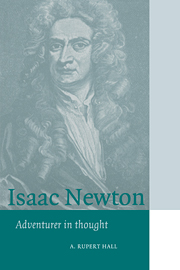Book contents
- Frontmatter
- Contents
- List of Figures
- General Editor's Preface
- Foreword
- Acknowledgement
- 1 The Hopeful Youth, 1642–1664
- 2 “The prime of my age for invention”, 1664–1667
- 3 Widening Horizons, 1667–1669
- 4 The Professor of Mathematics, 1669–1673
- 5 Publication and Polemic, 1672–1678
- 6 Life in Cambridge, 1675–1685
- 7 The Chemical Philosopher, 1669–1695
- 8 The Mathematical Principles of Natural Philosophy, 1679–1687
- 9 Private and Public life, 1685–1696
- 10 Fluxions and Fury, 1677–1712
- 11 Opticks, or a Treatise of Light, 1687–1704
- 12 Life in London, 1696–1718
- 13 A Man of Authority and Learning, 1692–1727
- 14 Later Books, 1706–1726
- 15 Kensington, 1725–1727
- Appendices
- Notes
- Bibliography
- Index
12 - Life in London, 1696–1718
Published online by Cambridge University Press: 12 January 2010
- Frontmatter
- Contents
- List of Figures
- General Editor's Preface
- Foreword
- Acknowledgement
- 1 The Hopeful Youth, 1642–1664
- 2 “The prime of my age for invention”, 1664–1667
- 3 Widening Horizons, 1667–1669
- 4 The Professor of Mathematics, 1669–1673
- 5 Publication and Polemic, 1672–1678
- 6 Life in Cambridge, 1675–1685
- 7 The Chemical Philosopher, 1669–1695
- 8 The Mathematical Principles of Natural Philosophy, 1679–1687
- 9 Private and Public life, 1685–1696
- 10 Fluxions and Fury, 1677–1712
- 11 Opticks, or a Treatise of Light, 1687–1704
- 12 Life in London, 1696–1718
- 13 A Man of Authority and Learning, 1692–1727
- 14 Later Books, 1706–1726
- 15 Kensington, 1725–1727
- Appendices
- Notes
- Bibliography
- Index
Summary
Warden of the Mint, 1696
It is a fair guess that Newton was never fully content with his professorial and collegiate life in Cambridge after the university had sent him to Parliament in 1689. Indeed, it may be that his eye began to rove as early as 1687, in the period of lassitude that must inevitably have followed the intense and exciting task of bringing the Principia to a conclusion in the summer of that year. By that time the acquaintance or friendship between Samuel Pepys PRS and Isaac Newton must have been established; besides the Royal Society, Christ's Hospital mathematical school had brought the two men together. Pepys was then at the height of his career and of his influence. At the peak of his psychological crisis in 1693 Newton wrote to Pepys: “I never designed to get anything by your interest, or King James favour,” an obvious allusion to days before the Revolution, after which Pepys's influence was nil. If we may read this anxious denial as evidence that there really was some such talk or manoeuvre (as with Newton's parallel denial to Locke), it must have occurred in 1687 or 1688.
Similarly and in the same disturbed frame of mind, Newton wrote to Locke: “I beg your pardon also for saying or thinking that there was a designe to sell me an office.” In this case, letters do hint at Locke's enlisting the help of the Earl of Monmouth (a favourite of William Ill's and recently First Lord of the Treasury) who had been a patron of Locke himself.
- Type
- Chapter
- Information
- Isaac NewtonAdventurer in Thought, pp. 294 - 321Publisher: Cambridge University PressPrint publication year: 1996



